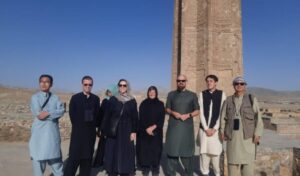KABUL (SW) – Despite the common belief that starting a business requires substantial funds, there are individuals who have initiated small enterprises with limited resources and creativity.
Razia Afzali is one such entrepreneur who began her online business three months ago with just 100 Afghanis. Operating under the page “Antique Brand Antique,” she sells hand-woven bracelets, bookmarks, keychains, and wall hangings featuring diverse and colorful designs. Razia ensures doorstep delivery for customers who order products from her page.
Razia pursued nursing at a private institute in Kabul when university opportunities for girls were limited. However, due to the family’s challenging financial circumstances, she has turned to selling handmade goods online.
“Our economic situation is not good. With the help of my sister, I try to cooperate with the family. With the 100 afghanis I had, I went to buy thread and weave some bracelets, I received more money from the sale of the bracelets and continued my work in this way,” she said.

The closure of schools for female students beyond the sixth grade has compelled some to engage in society actively by establishing workshops and online businesses.
Sadaf Farhad, a 19-year-old, is among these women who, following the closure of school opportunities for girls, has immersed herself in a small online business for the past four months. She crafts intricately designed handbags and sells them through her online page.
Sadaf says that she has crafted various handbags with vintage designs and fabrics, successfully attracting a growing number of customers.
A number of women in Kabul, in response to restrictions imposed on them, have ventured into online businesses, establishing stores where they sell homemade food, handicrafts, cosmetics, hygiene products, hijabs, bookmarks, and various books.
In addition to online stores operating within the country, some women residing outside Afghanistan also engage in selling various goods to citizens through their online stores.
Yasmin Hassanzada, the individual in charge of “Muska Online Cosmetics and Skin Care Store,” residing outside Afghanistan, extends services to Afghan citizens within the country. She borrowed money from friends to initiate her business. Ms. Hassanzada meticulously packages the ordered goods and dispatches them to Kabul, Herat, and Mazar-e-Sharif.
Citizens often express concerns and complaints about the low quality of goods sold through online stores. Diba, a resident of the 15th district of Kabul city, mentions that some online pages sell fake and substandard goods at high prices, leaving customers unable to return or exchange them after purchase.

Hadisa, an employee at a school in Kabul, who regularly utilizes online platforms for shopping, expresses a preference for online stores, particularly those established by women. She emphasizes the convenience of supporting women-owned businesses through her purchases, stating, “By buying from online pages created by women, we can support them. I am busy with work, I don’t have enough time to shop, and I always order the books I need online.”
Sajeda, a resident of the third district of Kabul city, expresses satisfaction with the convenience of online stores, stating that shopping online allows for easily obtaining needed products in less time.
Following the restrictions on education and employment for girls and women in Kabul and many provinces, they have turned to creating online stores with minimal expenses. These online businesses cater to the needs of women and citizens by selling various products.
ENDS






